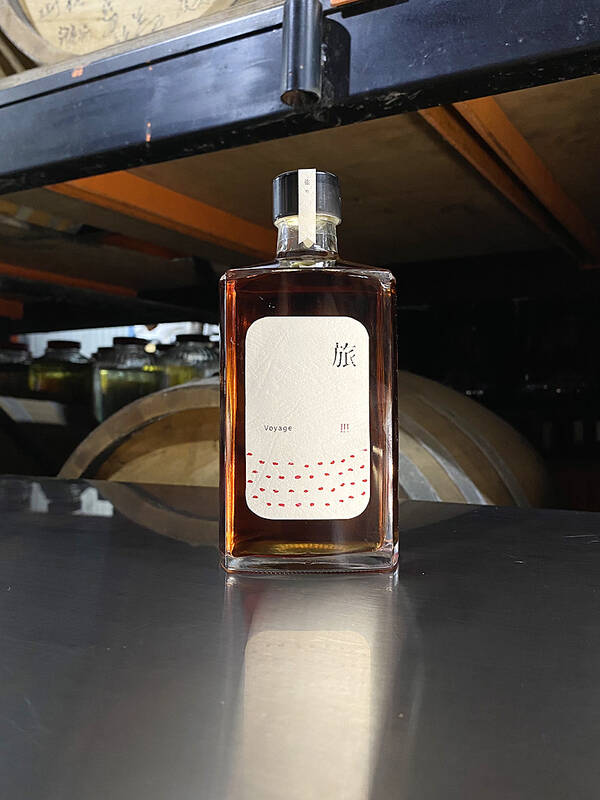Two spirits produced by a Taiwanese distillery using Taiwan-grown rice received unanimous recognition at this year’s San Francisco World Spirits Competition, the largest event of its kind in North America.
The spirits produced by Heng Chi Distillery earned Double Gold awards — an honor given to entries that receive top marks from all judges — at the mid-April event.
The results of the competition, organized by The Tasting Alliance, were announced on Thursday.

Photo courtesy of the Heng Chi Distillery via CNA
“If we want [our products] to be recognized internationally, we must produce high-value spirits,” Heng Chi representative Lo I-neng (羅已能) said on Thursday.
The award-winning products were Shoufeng Voyage 3, made with rice from Shoufeng Township (壽豐) in Hualien County, and Pocael 194 Rice Spirit, made with rice from the Hsinchu area.
The rice from Shoufeng is a variety introduced from Japan during the Japanese colonial period, while the Hsinchu rice has long been praised for its high quality as a food staple, Lo said.
The success of the Hsinchu rice spirit “proves that even rice not specifically cultivated for alcohol production can earn international recognition,” Lo said, adding that many other Taiwanese rice varieties could have similar potential.
“Taiwan’s land and its rice could gain global visibility with the right craftsmanship,” Lo said.
It could open up opportunities for Taiwanese farmers and the agricultural industry, Lo added.
While sake is the most internationally recognized rice-based beverage, Lo said that Taiwan’s climate is not well-suited for brewing it.
Instead, distilling locally grown rice into base spirits offers better opportunities, Lo said.
In addition to the two Double Golds, Heng Chi Distillery also took home three golds, five silvers and three bronzes — its best-ever result at the annual competition.

Nipah virus infection is to be officially listed as a category 5 notifiable infectious disease in Taiwan in March, while clinical treatment guidelines are being formulated, the Centers for Disease Control (CDC) said yesterday. With Nipah infections being reported in other countries and considering its relatively high fatality rate, the centers on Jan. 16 announced that it would be listed as a notifiable infectious disease to bolster the nation’s systematic early warning system and increase public awareness, the CDC said. Bangladesh reported four fatal cases last year in separate districts, with three linked to raw date palm sap consumption, CDC Epidemic Intelligence

The manufacture of the remaining 28 M1A2T Abrams tanks Taiwan purchased from the US has recently been completed, and they are expected to be delivered within the next one to two months, a source said yesterday. The Ministry of National Defense is arranging cargo ships to transport the tanks to Taiwan as soon as possible, said the source, who is familiar with the matter. The estimated arrival time ranges from late this month to early next month, the source said. The 28 Abrams tanks make up the third and final batch of a total of 108 tanks, valued at about NT$40.5 billion

Two Taiwanese prosecutors were questioned by Chinese security personnel at their hotel during a trip to China’s Henan Province this month, the Mainland Affairs Council (MAC) said yesterday. The officers had personal information on the prosecutors, including “when they were assigned to their posts, their work locations and job titles,” MAC Deputy Minister and spokesman Liang Wen-chieh (梁文傑) said. On top of asking about their agencies and positions, the officers also questioned the prosecutors about the Cross-Strait Joint Crime-Fighting and Judicial Mutual Assistance Agreement, a pact that serves as the framework for Taiwan-China cooperation on combating crime and providing judicial assistance, Liang

Reports of Taiwanese going missing, being detained or interrogated, or having their personal liberties restricted in China increased about fourfold annually last year, the Mainland Affairs Council (MAC) said yesterday. Last year, 221 Taiwanese who traveled to China were reported missing, were detained and interrogated, or otherwise had their personal freedom restricted, up from 55 the previous year, the council said. Reopening group tours to China would be risky, as it would leave travelers with no way to seek help through official channels after Beijing shut down dialogue between the associations tasked with handling cross-strait tourism, the MAC said. Taipei’s Taiwan Strait Tourism